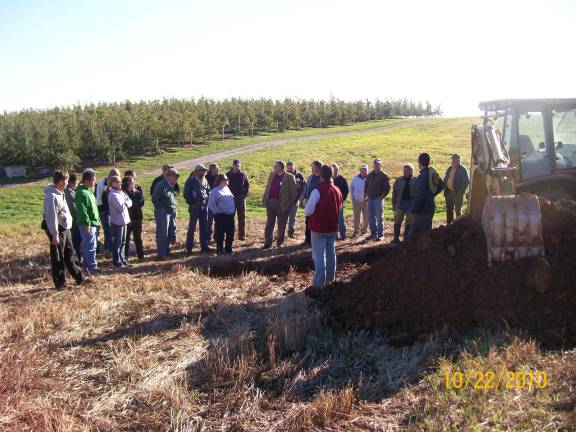Supervisors: Licensing soil scientists will run up costs, increase bureaucracy

MILFORD — Milford Township officials are regarding with suspicion a proposed new state law to license soil scientists.
At the May 19 township meeting, Supervisors' Chair Don Quick and Planning Commission Chair Kevin Stroyan said the bill now before the state house would expand the scope of the 1945 Engineer, Land Surveyor and Geologist Registration Law to include soil science. It includes a procedure for getting a professional soil scientist license from the state.
On the surface, Quick said, the bill appears simply to license soil scientists. But he said there's a subtext to the bill, which would require every municipality to employ licensed soil scientists to do work already being done by engineers and zoning officials. Work that has already been reviewed would have to be re-reviewed by the soil scientist, said Quick.
The bill would “add burdens to municipalities, the state and landowners,” he said.
Quick said he's already spoken with Melissa Morgan, the legislative coordinator for the Pennsylvania State Association of Township Supervisors (PSATS). He encourages other municipal leaders to do the same, adding that this is not legislation they should back.
The bill has been in the Professional Licensure Committee of the PA House since March 14.
The Pennsylvania Association of Professional Scientists supports the bill, saying that only a professional soil scientist has the know-how to prevent many of the damages that may occur as a result of construction, including structural damage, septic system failures, and chronic flooding. Their website (papss.org) says a professional soil scientist “is trained to understand the uses and limitations of the natural soil; conducts focused investigations best suited to site-specific applications; is educated and experienced in the interpretation of physical, chemical, and biological properties of soils; and is a necessary partner for other licensed professionals to rely on to meet the goals of safeguarding life and property.”
The association describes specific projects that failed because of the lack of soil expertise: see http://bit.ly/1nX3JJ8.
Planners to take up Route 209 restriction
Stroyan also objects to National Park Service Superintendent John Donahue's proposal to ban tractor-trailers and other commercial traffic on Route 209 through the park. He said the planning commission will be taking the issue up at its next meeting May 26.
Donahue says long-distance truckers use Route 209 mostly as a shortcut. But local businesses that travel locally, from the farmer's truck to the salesperson in his or her own vehicle, would also be affected, Quick said.
A letter from Donahue says commercial traffic has a negative impact on the five million visitors the park receives each year. Quick said this number is derived from counters on the roadways, which counts each passing vehicle as 2.6 people. It cannot tell if it's the same vehicle traveling both directions or multiple times a day.
At a Dingman Township meeting last spring, officials discussed how Stroyan, who is also the Pike County coroner and owner of Stroyan Funeral Home on Harford Street in Milford, is worried about how the closure will affect his duties as coroner and as operator of the funeral home. He must be able to access crime scenes and pick up people who have died in their residence.
Editor's note: The meeting started with an invocation remembering Gary Clark Jr., who died on May 13 at the age of 29. For more information please turn to page 15.